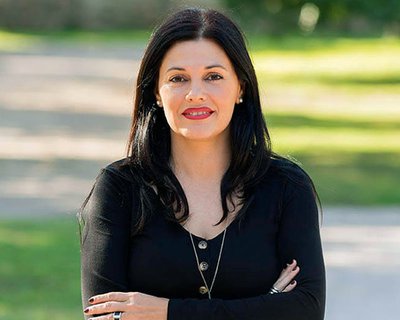-50% Discount on place reservation for 26/27 intake until February 28th!
Degree in Psychology in Alicante
The Bachelor’s Degree in Psychology in Alicante is designed to train professionals who are capable of understanding, analysing, explaining and interpreting human behaviour, intervening ethically and effectively and promoting and improving mental health and quality of life for both individuals and society as a whole.
Our academic model focuses on learning based on the resolution of real cases. Simulations using actors in specially prepared rooms will allow you to develop as a professional psychologist.
At the Universidad Europea, we’re committed to specialisation. We have two different specialisations, depending on the path that you choose: Clinical intervention and legal and forensic intervention.
After graduating in Psychology from the Universidad Europea in Alicante, you will feel prepared to address any challenge related to the area of psychology, in clinics, hospitals, companies or institutions or even in the field of research. Discover the fascinating world of the human mind and acquire the skills necessary to become a highly qualified professional who makes a difference in the lives of others.
Official degree issued by Alicante
| Campus-based | Alicante | 4 Years, 240 ECTS | Start: 14 sep. 2026 | School of Health Sciences of Valencia |
91%
Our students find employment in less than 12 months.
55%
You'll live in a diverse environment that is more multicultural than that of other universities.
3600
UEV has a multitude of educational cooperation agreements with other centres.
Testimonials
Study plan
Syllabus*
*This degree covers the curriculum outlined in Law 10/2022, of September 6, on comprehensive guarantees of sexual freedom.
Programa de estudios
PRIMER CURSO
| Materia | ECTS | Tipo | Idioma de impartición |
|---|---|---|---|
| History of Psychology and Areas of Practice | 6 | COMPULSORY | English (en) |
| Sensation, Perception and Attention | 6 | CORE | English (en) |
| Anatomy of the Nervous System | 6 | CORE | English (en) |
| Behavioral Biology | 6 | CORE | English (en) |
| Social Psychology I | 6 | COMPULSORY | English (en) |
| Developmental Psychology | 6 | COMPULSORY | English (en) |
| Statistics Applied to Psychology | 6 | CORE | English (en) |
| Life Cycle Psychology | 6 | CORE | English (en) |
| Personality and Intelligence Psychology | 6 | COMPULSORY | English (en) |
| Social Psychology II | 6 | COMPULSORY | English (en) |
SEGUNDO CURSO
| Materia | ECTS | Tipo | Idioma de impartición |
|---|---|---|---|
| Motivation and emotion | 6 | COMPULSORY | English (en) |
| Memories and learning processes | 6 | CORE | English (en) |
| Psychometry | 6 | CORE | English (en) |
| Psychopathology | 6 | COMPULSORY | English (en) |
| Educational psychology | 6 | COMPULSORY | English (en) |
| Thought and language | 6 | CORE | English (en) |
| Psychological evaluation | 6 | COMPULSORY | English (en) |
| Psychodiagnosis | 6 | COMPULSORY | English (en) |
| Modern Language | 6 | CORE | English (en) |
| Physiology | 6 | CORE | English (en) |
TERCER CURSO
| Materia | ECTS | Tipo | Idioma de impartición |
|---|---|---|---|
| Research Methods in Psychology | 6 | COMPULSORY | English (en) |
| Developmental disorders and learning disabilities | 6 | COMPULSORY | English (en) |
| Psychology of work and organizations | 6 | COMPULSORY | English (en) |
| Ethical values | 3 | COMPULSORY | English (en) |
| Prácticas Académicas Externas I | 9 | INTERNSHIP | Español (es) |
| Intervention techniques in psychology | 6 | COMPULSORY | English (en) |
| Elective I | 6 | ELECTIVE | English (en) |
| Elective II | 6 | ELECTIVE | English (en) |
| Elective III | 6 | ELECTIVE | English (en) |
CUARTO CURSO
| Materia | ECTS | Tipo | Idioma de impartición |
|---|---|---|---|
| University activities | 6 | COMPULSORY | English (en) |
| Communication skills | 6 | COMPULSORY | English (en) |
| Management skills | 6 | COMPULSORY | English (en) |
| Graduation Project | 6 | GRADUATION PROJECT | English (en) |
| Prácticas Académicas Externas II | 18 | INTERNSHIP | Español (es) |
| Elective IV | 6 | ELECTIVE | English (en) |
| Elective V | 6 | ELECTIVE | English (en) |
| Elective VI | 6 | ELECTIVE | English (en) |
ELECTIVES MENTION HEALTH:
| Materia | ECTS | Tipo | Idioma de impartición |
|---|---|---|---|
| Psychopathology II | 6 | ELECTIVE | English (en) |
| Neuropsychology | 6 | ELECTIVE | English (en) |
| Health Psychology | 6 | ELECTIVE | English (en) |
| Therapist skills | 6 | ELECTIVE | English (en) |
| Psychopharmacology | 6 | ELECTIVE | English (en) |
| Psychogeriatrics | 6 | ELECTIVE | English (en) |
| Psychological treatment in childhood and adolescence | 6 | ELECTIVE | English (en) |
| Psychological treatment in adults | 6 | ELECTIVE | English (en) |
LEGAL AND FORENSIC ELECTIVES:
| Materia | ECTS | Tipo | Idioma de impartición |
|---|---|---|---|
| Psychology of testimony | 6 | ELECTIVE | English (en) |
| Prevention and treatment of delinquency | 6 | ELECTIVE | English (en) |
| Mediation and conflict resolution | 6 | ELECTIVE | English (en) |
| Victimology | 6 | ELECTIVE | English (en) |
| Skills for the social and educational intervention of offenders | 6 | ELECTIVE | English (en) |
| Domestic and gender violence | 6 | ELECTIVE | English (en) |
Programme implementation
The Bachelor's Degree in Psychology began to be taught in the academic year 2023/2024.
Number of places for incoming students
335 (115 face-to-face Spanish Valencia / 40 face-to-face English Valencia / 40 face-to-face Alicante / 40 face-to-face English Alicante / 100 online learning).
Internships
Internships are a key component of your education. Acquiring experience after what you have learned on your degree is the best way to enter the employment market. There are two types of internships: curricular—which are included in your study plan—and extracurricular—which you can do on a voluntary basis.
In order to complete curricular internships in companies, you will need to have 50% of the credits approved and to register the subject before starting your internship. These internships are monitored by the company and the internship coordinator, and interim and final reports are prepared for evaluation.
If you want to take your work experience to the next level before finishing your university education, you can pursue an extracurricular internship. You can do them in any academic year, but keep in mind that internships are a formative complement to your studies; therefore, the more knowledge you have acquired throughout your studies, the more you will benefit from the internship experience.
These are some of the companies where you will be able to do an internship:
- JUAN IGNACIO MARTÍNEZ (PSICOLOGÍA CLÍNICA Y PSICOANALISTA)
- CENTRO PSICOPEDAGÓGICO EDUCAS
- CENTRE PSICOPEDAGÓGICO SOL MAITE CORTELL GUALDE
- GABINETE PSICOPEDAGÓGICO NOVOPEDIA
- CENTRO PSICOPEDAGÓGICO Y LOGOPÉDICO PAPALIA
- MAITE FUSTER PÉREZ GABINETE PSICOPEDAGÓGICO
- ARETÉ
- MERE INTERVENCIÓN SOCIOEDUCATIVA
- SERNA&BERNABEU PSICOLOGÍA Y PSICOPEDAGOGÍA
- MARÍA JOSÉ FLORES – PSICOPEDAGOGÍA Y PSICOLOGÍA
- CENTRE PER TU
- AVANZA. GABINETE PEDAGÓGICO Y LOGOPÉDICO
Graduate profile
The Bachelor's Degree in Psychology provides a comprehensive, evidence-based education that equips students for professional practice, innovation, and research in the field. Graduates are prepared as generalist professionals, skilled in assessing and intervening across various contexts such as educational, family, workplace, and social settings, among others. Additionally, the degree opens pathways to clinical and healthcare roles through the Master's in General Health Psychology or the PIR (Resident Psychologist) training program. It also offers access to non-clinical fields through specialized Master's programs (e.g., Child and Adolescent Psychology, Psychogeriatrics, Eating Disorders, Legal and Forensic Psychology, Human Resources, Social Intervention, Neuropsychology, etc.).
Graduates are trained to identify needs and challenges in individuals and groups, and to carry out evidence-based assessments and interventions in a technical, innovative, and ethical manner. This training applies to established professional areas such as clinical and health psychology, educational psychology, occupational psychology, and social intervention, as well as emerging fields like crisis intervention and psychology related to disability and dependency. Additionally, the degree prepares students to contribute to research aimed at promoting and improving the health and well-being of diverse populations.
Employability
This degree provides you with the scientific knowledge necessary to understand, interpret, analyze, and explain human behavior, and to intervene with ethical conduct.
Career opportunities
Health field: general health psychology and clinical psychology
- Professional in psychology in public and private healthcare institutions, as well as private practices.
Educational field
- Counselor in educational institutions.
- Teaching and university research in the specialized area.
- Teacher, with the corresponding master's degree according to the educational level.
Professional development in organizations
- Consultant in human resources departments.
- Training.
- Consulting in marketing and advertising.
- Market research analyst.
- Data scientist: big data analytics.
- Occupational health and safety: ergonomics and applied psychosociology.
Sports field
- Educational centers.
Admissions
Start your future at Universidad Europea
You can become a student at Universidad Europea in three easy steps.
1
Admission exams
Start your admission process by calling +34 966282409 or request information and our advisors will contact you.
2
Place reservation
Once you have been admitted, secure your place by paying the reservation fee.
3
Enrollment
Submit the required documents to formalise your enrollment.
Scholarships and financial aid
We want to help you. If you want to study at Universidad Europea, you will have at your disposal a wide selection of own and official scholarships.
Credit recognition and transfers
You don’t have to stick with something you don’t like. That’s why we’ve designed specific plans for credit recognition and transfers.
Request your online credit recognition review, transfer your academic file and start studying at Universidad Europea.
Admission profile and entry requirements
The profile of students beginning a Bachelor's degree in Psychology is usually quite diverse. However, it is advisable that they demonstrate a certain predisposition for establishing interpersonal relationships, which will enable them to engage in various contexts where human behavior is studied. It is recommended that students possess the following personal and academic characteristics:
- Interest in aspects related to health and quality of life
- Social commitment
- Ethical commitment
- Scientific curiosity
- Skill in interpersonal relationships
- Ability to adapt to new situations
- Ability to work in teams
- Ability to apply knowledge in practice
- Emotional competencies relevant to the profession
- Competency in oral and written expression
- Proficiency in the English language
- Competency in the use of basic computer tools
- Basic knowledge of biology
- Basic knowledge of statistics
For students entering the Bachelor's degree in Psychology through university entrance exams (PAU) after high school, the ideal profile includes one of three current high school tracks: Technology, Health Sciences, or Social Sciences. Nevertheless, access to the degree is possible from any high school track.
Access and Admission of Students:
Students may gain access to the bachelor's degree if they meet the applicable legal requirements, specifically:
- Passing the University Access Exam, as per the applicable legislation.
- Passing the University Entrance Exams for students over 25 and over 45 years old.
- Higher-level technicians, Higher-level Technicians in Plastic Arts and Design, and Higher-level Sports Technicians.
- Diploma holders, Degree holders, Technical Engineers, Engineers, Architects, or Graduates.
- High school students from educational systems of EU member states and other countries with signed international agreements may access the Bachelor's degree if they have access to university in their educational system and comply with current regulations.
- Students from other countries and those without an international agreement must validate their studies and take the university entrance exam if required by Royal Decree 412/2014.
- Applicants with work and professional experience related to the field of study who do not hold any academic qualification enabling university access through other means and who are 40 years of age or older by October 1 of that year.
Additionally, for students wishing to pursue their bachelor's degree in a language other than their native one:
- Must have a B2 level of the CEFR - Council of Europe in the language in which they will pursue the degree to access the program, and therefore must provide language certification at that level, accredited by CRUE's language committee.
University Admission for Students Over 25 Years of Age:
Candidates who are 25 years old in the calendar year in which the exam is taken, and who have no other means of access to university, may apply via the University Access Exam for Students Over 25.
Candidates may take the exam at as many universities as they deem appropriate. Additionally, if they wish to improve their grade after passing, they may retake the exam in subsequent sessions. The new grade will be considered as long as it is higher than the previous one, except when the exam is taken at a different university, in which case only the most recent grade will be considered.
Students who have already passed the exam in a previous academic year, and even enrolled at another university, may still retake the exam.
University Admission for Students Over 45 Years of Age:
The University Access Exam for Students Over 45 is aimed at individuals who are 45 years old by October 1 of the year they begin the degree and who have no other legal means of access to university.
The University Access Exam for Students Over 45 at the European University of Valencia is governed by Royal Decree 412/2014 and the Resolution of November 26, 2014, of the Directorate General of Universities and Research, which publishes the Agreement of the Organizing Committee outlining the rules and instructions regulating the University Access Exam for Students Over 45.
University Admission for Students Over 40 Years of Age:
Applicants with work and professional experience related to the field of study who do not hold any academic qualification enabling university access through other means and who are 40 years of age or older by October 1 of that year.
This applies only to degrees that require this exam in their curriculum, and the applicant's professional experience must be relevant to the degree they wish to pursue.
It is a mandatory requirement to recognize at least 30 ECTS credits for students with partial or complete foreign studies.
The applicant must provide proof of work and professional experience and submit, along with their application, a portfolio of evidence that includes the following:
- A sworn statement that they do not hold any academic qualification enabling university access through other means.
- A motivation letter (template provided by the European University of Valencia).
- Work background experience
- Curriculum Vitae.
- Documentary evidence: letters of recommendation, certificates from training courses, or any other document related to the degree they are applying for.
- Languages skills
The candidate will undergo a personal interview to evaluate competencies that require direct observation and are related to academic success in the degree for which they are applying, as well as to identify specific training needs.
All this information is published on the university's website.
Faculty
66% of those teaching on this bachelor's degree hold PhDs.
Our teaching staff
- Óscar Elía Zudaire, PhD.
PhD in Neurosciences at the Institute of Neurosciences of Alicante (UMH–CSIC), with a degree in Psychology from the University of the Basque Country (2016), including an exchange year at San Diego State University (USA). He completed a Master’s in Biomedical Research with a specialization in Neuroscience and Cognition at the University of Navarra (2017), being the only Psychology graduate admitted. His doctoral research, funded by the Generalitat Valenciana (ACIF program), included national and international stays at the University of Navarra and the University of Haifa (Israel). He has authored and co-authored several publications in neuroscience and neurology, participated in research and teaching innovation projects, and received awards for scientific outreach. Currently, he teaches Psychology at undergraduate and master’s level and serves as International Affairs Manager at ISABIAL, coordinating international collaborations and European funding. - Higinio González García, PhD.
PhD in Psychology from Miguel Hernández University (2017). Holds a Master’s in Sports Performance and Health, a Master’s in Human Resources Management, a Bachelor’s in Psychopedagogy, a Bachelor’s in Sports Sciences, and a Bachelor’s in Primary Education. His research career, though relatively brief, has been particularly intense, with more than 59 publications in international journals (27 JCR, 22 SCOPUS, 10 in other indexations) and participation in over 50 national and international conferences. His academic impact is reflected in Google Scholar metrics (h-index 17; i10-index 29; over 800 citations since 2017). He has completed a research stay at Université Claude Bernard Lyon 1 and a teaching stay at the University of Bologna. His teaching experience exceeds 2,000 hours across undergraduate and postgraduate programs, including supervision of final projects and co-direction of two doctoral theses. - David Reyes Jiménez, PhD
PhD in Psychology from the University of Jaén with International Mention and Cum Laude distinction. Graduated in Psychology (2015) and obtained a Master’s in Cognitive and Behavioral Neuroscience from the University of Granada (2016). His doctoral thesis, “Habituation in the Earthworm”, was developed within the HUM-642 research group Comparative Psychology: learning, attention and memory, focusing on learning processes in invertebrates. He completed an international research stay at the University of Leicester (United Kingdom) under the supervision of Professor José Prados. In addition, he holds a Master’s in Teacher Training (UNIR, 2020), which complements his research profile with pedagogical training. His work combines university teaching with research in Comparative Psychology and Neuroscience. - Mar Aníbal Martínez, PhD
PhD in Neurosciences with nine years of research experience at the Instituto de Neurociencias de Alicante, where she developed her doctoral thesis “Intra-modal plasticity of somatosensory maps during early mouse development”. Her expertise includes neurodevelopment, neuroanatomy, calcium imaging, thalamo-cortical connectivity, sensory plasticity, scientific writing, and mentoring. Her main research areas focus on Development, Neuroscience, Neuroanatomy, and Brain Plasticity. Since the 2025–2026 academic year, she has been teaching at Universidad Europea in Dentistry (Epidemiology and Public Health, Physiology of the Stomatognathic System, Human Anatomy) and Psychology (Nervous System Anatomy, Physiology, Behavioral Biology, and Statistics). Her combined teaching and research experience provides a strong foundation to contribute to both academic training and the advancement of knowledge in the neurosciences.
Title coordination table
CV of the degree’s faculty
Frequently Asked Questions
What jobs can I get with psychology degree?
There are many jobs that you can get with a degree in psychology. Students at Universidad Europea de Valencia have gone on to enjoy successful careers in different areas such as:
- Health
- Teaching
- Professional development
- Sport
- Legal and forensic
It's important to remember that some jobs may require additional education or certification, or license to practice, depending on what country you work in. Additionally, some jobs may be more competitive than others. Before deciding on what path do go down, it's a good idea to research specific job opportunities and requirement and find out about the ones that best fit for you.
How many years does it take to study psychology?
The degree in psychology at Universidad Europea de Valencia takes four years to complete and consists of 240 ECTS.
During the course of the degree, you will have opportunities to not only complete in internships and work placements at leading organisations, but you can also take part in study periods abroad. During the degree, you can also choose to complete specialisations in two areas: Clinical intervention and legal and forensic intervention.
Is psychology a hard degree?
Psychology can be a challenging degree, as it involves studying complex theories and research methods. However, at Universidad Europea de Valencia, you will have all the support you need to be successful no matter what field of psychology you go into once you graduate. Our faculty is made up of leading professionals and experts in their areas, so you’ll be learning from the very best.
In addition, our innovative learning methodology means you’ll be working on real case studies from day one – allowing you to build the skills – and confidence – necessary not only to complete the degree but enjoy a successful career afterward.
Are psychologists in demand?
Yes, psychologists are in high demand. The field of psychology is growing, and there is a need for psychologists in a variety of settings, including schools, hospitals, government agencies, and private practices.
By choosing the degree in psychology at Universidad Europea de Valencia, you will gain the skills and knowledge to succeed in whatever area you choose to go into. Studying alongside a top faculty made up of experts in the area and having close contact with the profession throughout your program will mean you will have the most sought-after profile when t comes to looking for employment once you graduate.




